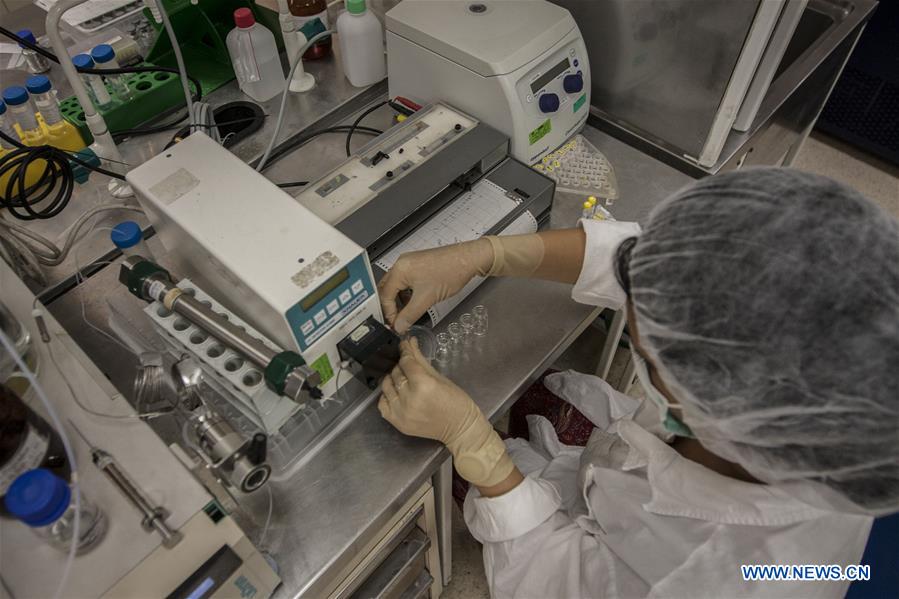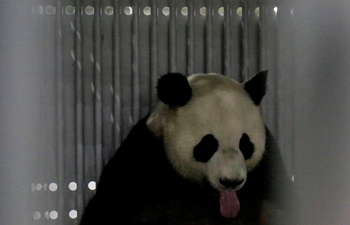
Photo taken on June 20, 2017 shows a researcher working at Cuba's Center for Genetic Engineering and Biotechnology (CIGB) in Havana. Cuba's half a billion-dollar biotechnological industry, considered key to the country's future, is looking to expand with innovation and overseas market development. (Xinhua/Joaquin Hernandez)
by Raimundo Urrechaga
HAVANA, June 24 (Xinhua) -- Cuba's half a billion-dollar biotechnological industry, considered key to the country's future, is looking to expand with innovation and overseas market development.
"Today we export our established products to about 50 countries, and we have a portfolio of innovative and unique drugs that are in different stages of research or clinical trials," Merardo Pujol, business development director at Cuba's Center for Genetic Engineering and Biotechnology (CIGB), told Xinhua.
Cuban scientists are looking to the future for new ways to create unique and innovative drugs that not only benefit the island's population but also millions of people around the world.
The industry has also made breakthroughs in therapies despite U.S.-led trade embargo and blockade, but needs new markets to grow.
BIRTH OF CUBAN BIOTECH
More than three decades ago, Cuba set its sights on becoming a biotechnology powerhouse.
In the late 1970s, Cuba sent its best scientists to Europe and the United States to study at leading research centers in the emerging field of biotechnology.
An epidemic of dengue in the early 80s jump-started Cuba's fledgling biotech industry, which developed Interferon, a drug that hinders potent viruses.
"In the early stages of Cuba's biotechnology, the leading product was Interferon, and later scientists began to produce biological drugs using recombinant techniques related to genetic engineering," Pujol introduced.
The CIGB was founded in 1986 as the leading institution of Cuba's biotechnology industry. At the research center, the whole scientific cycle from initial research to the production and commercialization of signature drugs is carried out.
Today, "CIGB researches, develops intellectual property or patents, turns laboratory findings into pilot tests and produces drugs on a large scale for exports," said Pujol.
The CIGB developed a recombinant Hepatitis B vaccine in 1990 and practically eliminated the disease in Cuba. The center continues to produce effective vaccines, such as Heberpenta, which protects against diseases like influenza.
Along with its international scientific development, Cuba expanded its research and medical centers to produce drugs through different techniques.
The Center for Molecular Immunology (CIM), founded in 1994, initially developed monoclonal antibody technology for different medical uses.
"The CIM's first product was a monoclonal antibody called OKT3 that was produced for kidney transplants, to prevent patients from rejecting the new organ," Eduardo Ojito, deputy director of the CIM, told Xinhua.
After more than two decades of scientific research, the CIM has also produced high-impact drugs and vaccines against certain types of cancers.
The CIM sells its products to more than 30 countries, exporting five leading drugs and has registered some 100 medications internationally.
Currently, the biotechnology industry contributes more than 500 million U.S. dollars a year to the Cuban economy, with the CIGB alone earning more than 100 million dollars from exports last year.
INNOVATIVE THERAPIES
The CIM registered a drug in 2008 that years later brought hope to millions of people suffering from lung cancer.
The vaccine, called the CIMAvax-EGF, seeks to improve the quality of life of lung cancer patients, and is used by Cuba's healthcare system and in four other countries.
"It does not kill cells directly, but starves them by preventing epidermal growth factor (EGF) from attaching to its proper receptor on the cell," explained Ojito.
The vaccine agent is coupled with a "carrier protein" that further stimulates the immune response and triggers it into producing antibodies against the EGF protein.
"CIMAvax-EGF has already undergone extensive clinical trials in Cuba and around the world, and is an approved therapy for the treatment of lung cancer not just on the island, but also in Colombia, Peru, Paraguay, and Bosnia and Herzegovina," he said.
The vaccine is registered in all continents for possible commercial use worldwide. More than 4,000 lung cancer patients have been treated with the vaccine in global clinical trials, and results show prolonged tumor stabilization, significantly improved overall survival rates and quality of life.
"Today we can say based on statistics that 30 percent of patients receiving the CIMAvax-EGF vaccine positively benefit from the product with substantially improved quality of life," said Ojito.
Another Cuban product that has transformed the biotech industry is Heberprot-P, a medication created in 2006 for treating diabetic foot ulcers.
"With every injection, amino acids and protein synthesis divide cells and the foot ulcer begins to fill with healthy, vigorous tissue, and in about three months on average the wound is completely closed," Dr. Manuel Raices, a researcher at the CIGB told Xinhua.
Currently, Heberprot-P is registered in 23 nations in all continents and used in 10 countries.
"Our product has already been used on more than 60,000 patients in Cuba and around 250,000 patients worldwide, preventing more than 70 percent of amputations," said Pujol.
According to these researchers, the success of the Cuban biotechnology industry lies in its collaboration with the nation's universal healthcare system, which has success rates comparable to developed countries.















